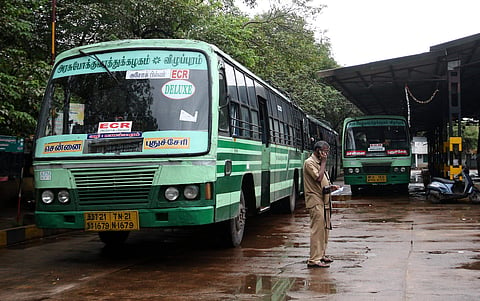

In the run-up to the TN budget, TNIE will highlight readers’ expectations of the new government. To be featured, tweet @xpresstn with #MydreambudgetTN
CHENNAI: One of the greatest challenges before the DMK government is finding a way to save the eight debt-ridden transport corporations. The entities, having a total fleet strength of 19,500 buses, are buckling under a debt of Rs 33,000 crore. And that figure is wont to rise as the average daily loss they make stood at Rs 20 crore as on August 7, according to official data obtained by The New Indian Express.
Rising diesel prices and high operational costs take most of the blame. According to the data, the share of fuel expenses in operational cost stood at 15-20 per cent till 2018. By July this year, it rose to 35 per cent, thanks to a jump in diesel prices from Rs 63.5 a litre in January 2018 to Rs 94.39 a litre as on Saturday. Other reasons cited include suspension of bus services during the lockdown, drop in commuter patronage, and resumption of services in non-viable routes.
Employees' salary accounts for 51 per cent of the total expenditure of the corporations. Of the Rs 33,000 crore debt, Rs 8,000 crore is the provident fund, gratuity, and other deductions from employees' salaries, said Arumuga Nainar, General Secretary of Transport Employees Federation affiliated to the CITU. "The government should consider allocating a minimum of Rs 4500 crore annually for the next few years to reduce its debts. We also expect a roadmap to ensure the debt does not rise."
A large part of the loans taken from banks pledging properties of the corporations since 2006 had been transferred to the Tamil Nadu Transport Development Finance Corporation (TDFC), a Public Sector Undertaking (PSU), said Nainar.
Barring buses running in mofussil and long-distance routes, over 9,000 services, including MTC, ordinary buses and hill station buses, are being operated despite being economically unviable. "The buses are operated only to serve the people. Considering the role played by buses in public mobility, the government should compensate for the loss," added Nainar.
The daily patronage, which stood at 2.1 crore till early 2017, plunged to 1.6 crore after the bus fare was revised in January 2018. The patronage further dropped to 1.3 crore in 2020 owing to a delay in filling vacancies and the subsequent cancelation of services.
A group of experts in urban planning and transportation, however, pointed out that the transport corporations are not profit-making ventures, but a social investment. Daniel Robinson, one of them, said that Punjab, Maharashtra, and Tamil Nadu always topped in the human development index charts not only because of affirmative action (reservation) but also investment in public transport.
"Government buses are a socially engineered investment. It facilitates movement of people from one place to other, thereby eliminating bottlenecks in accessing schools, colleges, and hospitals. It also improved employment opportunities," he said.
Currently, bus transportation does not provide viable cost or time advantages to the passengers. "Only if we provide some additional value such as dedicated lanes and congestion charge (fee to be paid by motorists for entering congested areas) can we solve issues with public transportation. Social-obligation routes makeup only a small percentage of the loss," Robinson added.
Official sources from the transport department said that plans for the revival of the department would be implemented post Covid 19 restrictions. "Bus rapid transit systems, which provide dedicated lanes for buses, were already proposed in Chennai and a few other places," said a senior official.
The official added that women's patronage, which stood at 40 per cent, increased to 60 per cent after introducing free-travel for them in ordinary buses. The government has earmarked Rs 1,350 crore annually for the corporations. "We are yet to study the economic and environmental advantages of the scheme. Revamp plans will be taken up when conditions become conducive for complete resumption of services," the official said.